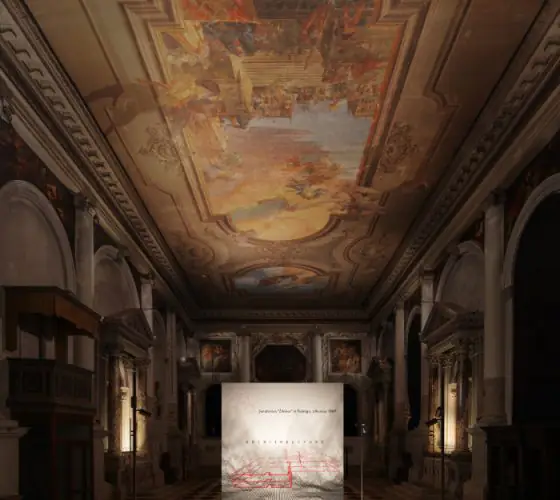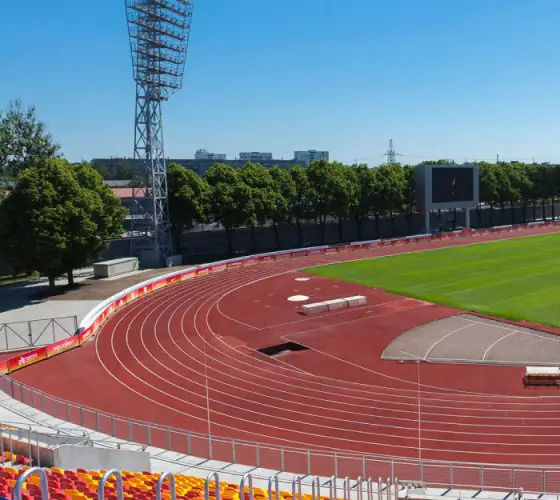
adobestock.com
Every country has important architectural buildings that form a recognizable image of the cultural and historical landscape. Latvian fields are hard to imagine without grain dryers—special facilities for removing excess moisture from grain. If you have ever traveled around Latvia outside of cities, you have probably seen how in the middle of pastoral landscapes sometimes grow elongated buildings of strange shapes—these are agricultural grain dryers.
Particularly spectacular are the dilapidated grain dryers of the Soviet period. They resemble the scenery from the famous Mad Max media franchise—a steampunk fantasy.

Photo and painting: Artis Zvirgzdiņš, 2023
Modern grain dryers are also impressive. Most often they consist of several giant metal cylinders with cone-shaped tops. In good weather, they glisten spectacularly in the sun, making them particularly visible among agricultural fields.

Photo and painting: Artis Zvirgzdiņš, 2023
The romanticization of technical structures, factory buildings and loft aesthetics in general is not a new phenomenon. Far fewer people are inspired by farm architecture because this architecture is outside of big cities. Some expressive grain dryers are located off major highways and can only be admired in all their glory by their owners and rare locals.

Photo and painting: Artis Zvirgzdiņš, 2023
Guide to Latvian Grain Dryers
There are hundreds of farms in Latvia equipped with grain dryers of various designs. Describing them all is quite a difficult task and deserves a full-fledged scientific study. We have tried to describe the most interesting buildings from the point of view of their shape and aesthetics. Some of the grain dryers in our guide are accompanied by photos of paintings and sketches by Artis Zvirgzdiņš.
Grain dryers are needed to reduce the moisture in grains and seeds, thus improving the quality of the harvest and allowing it to be stored for a longer period of time. From an architectural point of view, the most interesting grain dryers are shaft dryers. This type is common among both Soviet and modern designs. As a rule, these dryers stand between grain storages in the form of vertical cylinders, i.e. between elevators or grain bins.

In the Soviet Union, other types were often used: drum grain dryers, a design with a metal horizontal drum, and carousel grain dryers, where grain is dried in a relatively low rotating cylindrical container. Often in one agricultural complex you can find several types of dryers combined with storage tanks for dried grain.

One of the most expressive agricultural complexes is located in Augstkalni on the highway between Aizkraukle and Aizpuri. The buildings from the 1970s and 1980s have long been in need of renovation—time has clearly not spared them. But in this state they look particularly colorful, reminiscent of abandoned mines from movies about the Wild West.

A grain dryer from the 1970s and 1980s near the village of Šēdere looks very picturesque against the background of hilly fields. The grain elevators are covered with rust, gradually merging in color and tone with the neighboring trees.

For example, in the settlements of Matīši and Riebiņi, grain drying and storage tanks are, as usual, adjacent to each other, creating an interesting architectural rhythm of wide elevators and slimmer, tauter ones. The new agricultural complexes, unlike the old ones, contrast much more strongly with the surrounding nature because of the color of the metal, which stands out against the general background.

Sometimes new grain dryers built in the last two decades stand next to old dryers from the 1950s and 1980s. They perform the same function, but are equipped with more modern equipment that dries grain in larger volumes more efficiently and damages it less.
Most often metal sheets are used to create elevators for dryers and granaries, and the adjacent structures are covered with wooden cladding. Sometimes, however, farms have cylindrical tanks made of asbestos cement. As a rule, they do not store grain, but silage—fodder for livestock. Asbestos cement does not rust and has high fire resistance, which is good for long-term storage of cut field grass.
The large complexes we are mainly talking about were built from about the 1970s to the present.In the 1950s and 1960s, more compact constructions prevailed. The grain dryer in Pilskalne in the Augšdaugava Municipality belongs to this type of buildings. It is depicted in one of the last paintings by Artis Zvirgzdiņš, made with acrylic paints and gel pen on a small canvas of 20×20 centimeters.

Paintings of Grain Dryers
Riga-based artist Artis Zvirgzdiņš has been photographing grain dryers around the country and depicting them in his paintings since 2023. Now he has about twenty works in his collection, which can be seen on his Instagram account, as well as in solo and collective exhibitions.

Painting: Artis Zvirgzdiņš, 2023

Painting: Artis Zvirgzdiņš, 2023

Painting: Artis Zvirgzdiņš, 2023
Rusty metal elevators are the main expressive element of old agricultural complexes. They create a special texture and color, which gives the grain dryers a special charm. This is well reflected in the paintings of Artis Zvirgzdiņš, painted with a painting knife.

Painting: Artis Zvirgzdiņš, 2023

Painting: Artis Zvirgzdiņš, 2023

Painting: Artis Zvirgzdiņš, 2023
There is nothing superfluous in the paintings of Artis Zvirgzdiņš—only the grain dryers and the landscape in which they stand. He deliberately removes from the image trees, agricultural machinery, residential and other buildings that obscure the main object. It is an observation of pure form, but not just the form the engineers came up with, but the form it has become over time.

Painting: Artis Zvirgzdiņš
The architecture of grain dryers has inspired Artis for about 20 years. He used to ride his bicycle a lot around Latvia and take pictures of the buildings he liked. Often the cylindrical elevators covered with simple gable roofs seemed to him like “agricultural cathedrals”—a kind of lost temples of economic activity of collective and state farms.
Since May 7, 2024, the House of the Latvian Association of Architects in Riga has been hosting an exhibition of the artist’s paintings. You can make an appointment to visit the exhibition and find out the exact opening times by contacting Artis personally by writing him a message on Instagram.

Drawing: Artis Zvirgzdiņš

Drawing: Artis Zvirgzdiņš

Drawing: Artis Zvirgzdiņš

All grain dryers whose images we use in this article are marked on the map:







